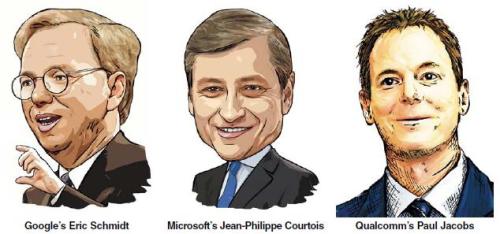Top executives of U.S. companies make successive visits for cooperation
November has been an especially busy month for the local IT industry with a number of IT gurus from the U.S. visiting Korea, intending to devise business plans for next year.
The visits started with Eric Schmidt, chairman of Google Inc., who arrived for the second time in Seoul since 2007, followed by Qualcomm chairman Paul Jacobs and Microsoft International’s president Jean-Philippe Courtois later in the month.
The government, along with the IT industry, was surprised to witness such a rush of well-known names to one of the most wired nations in a single month.
“The visits of high-ranking officials in the IT industry were considered unusual compared to the past. It means Korea, especially the country’s IT companies, has grown to become an important strategic partner,” said Kim Jae-chul, director of international corporation division at the Korea Communications Commission.
The three gurus all stopped by the KCC, the state regulator of telecommunications and broadcasting, to ask for the government’s cooperation in business operations and management.
Schmidt, who was in Seoul on Nov. 7-8, said Google is “very committed to Korea,” adding that that meant providing investments, partnerships and benefits.
“Korea’s important. Korea’s a huge success for us. Korea’s a leader in smartphones,” he said when asked what was the reason for fitting in his two-day stay with so many meetings.

Schmidt met with executives of Samsung Electronics, LG Electronics, SK Telecom, KT Corp. and LG Uplus as well as POSCO, discussing a wide range of topics, from the introduction of Google TVs to the possibility of constructing a premium network for Google in Korea.
A high-ranking source in the telecommunications industry, who wished to remain unidentified, said Google suggested building a premium network for the company to a Korean firm, adding that it would pay the cost.
Samsung visual display chief Yoon Boo-keun told reporters last week that Samsung and Google are in final talks to produce Google TV and that the company will announce the release date at the Consumer Electronics Show in Las Vegas in January.
A foreign media outlet reported that LG Electronics will unveil the LG Smart TV at CES 2012, but an LG official said it was still undecided, adding that the firm’s TV division is currently looking at several options, including its own proprietary platform Netcast.
“There’s a chance for Google to continue its TV business with Korean partners, especially with Samsung TV chief Yoon comments adding to the possibility. Partners located in Korea are inevitably important,” said another executive industry source.
Last October, Google unveiled its new Google TV in partnership with Sony and Logitech. However, it was labeled a failure due to its high price, complicated user interface and lack of differentiation points compared to internet-connected TVs.
The source also said Korean businesses are considered highly valuable to Qualcomm, a company that makes mobile phone processors and radio chips, because of the fourth-generation network Long Term Evolution chip set market.
“The Korean market as a whole is not so attractive to the global IT firms for it only takes 2-2.5 percent of the global market, but it’s the Korean IT companies that are luring them to Korea,” he said.
Qualcomm unveiled its first e-book reader based on the firm’s Mirasol display technology, together with Kyobo, in Seoul last Tuesday.
With plans to dive into other overseas markets by partnering with firms there, the release was the beginning of its global launch of e-book readers, according to Clarence Chui, senior vice president of Qualcomm MEMS Technologies.
Industry sources say what was most noticeable about the event was that Qualcomm chose Korea as the first country to launch the new technology in and its chairman attended the press conference.
“This is another long history of launches of the brand new technology by Qualcomm with partners in Korea,” said Jacobs.
For Microsoft, constructing a data center in Korea was among the possibilities as it may become a way to work with Korean companies in the cloud computing sector.
Courtois, who was here last Thursday, suggested to KCC chief Choi See-joong that Microsoft could exchange its cloud computing technology with local companies and sign strategic partnerships with big-scale system integration firms here.
In response, Choi said Microsoft should move to build a data center in the country as it has ideal conditions for such a project.
The event comes as Microsoft is preparing to build additional data centers around the world to expand its service boundaries for cloud computing.
Courtois also visited Samsung Electronics to discuss the launching of smartphones and tablet PCs running on the Window operating system. The Windows smartphone called Mango phone and tablet PC are projected to roll out by the year’s end and the first half of next year, respectively, at the earliest.
On a related front, KT Corp. held a conference with Microsoft in southern Seoul on Tuesday as part of an agreement to nurture about 1,000 Windows app developers every year ahead of the Mango phone launch.
(
sharon@heraldcorp.com)








![[Weekender] Korea's traditional sauce culture gains global recognition](http://res.heraldm.com/phpwas/restmb_idxmake.php?idx=644&simg=/content/image/2024/11/21/20241121050153_0.jpg)